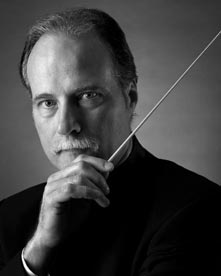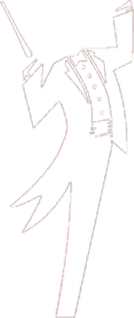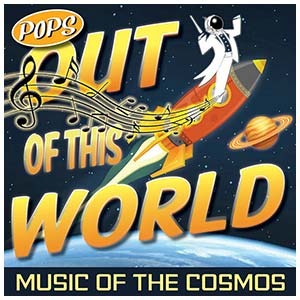Thus Spake Zarathustra (2001 A Space Odyssey)
Richard Strauss (1864 – 1949)
Highlights from Wicked
Stephen Schwartz (1948 – )
The Complete Harry Potter
John Williams (1932 – )
The Lord of the Rings: Return of the King Suite
Howard Leslie Shore (1946 – )
Theme from Jurassic Park: The Lost World
John Williams (1932 – )
Over the Rainbow from The Wizard of Oz
Arlen/Sayre
Selections from Apollo 13
James Horner (1953 – 2015)
Jupiter from The Planets
Gustav Holst (1874 – 1934)

Gene Dowdy
Conductor & Artistic Director
Conductor’s Letter
Dear Friends,
The Symphony of the Hills will ring in the New Year with a tremendously energetic and inspiring pops concert featuring music inspired by the cosmos! If you think about it, some of the most thrilling orchestral music is inspired and influenced by other worlds outside of our own, and even parallel worlds from other dimensions.
What more appropriate way to open this concert than with Richard Strauss’s powerful fanfare from “Thus Spake Zarathustra,” which Stanley Kubrick famously used as the main title music for his groundbreaking movie, “2001: A Space Odyssey.” Each new year is an odyssey of sorts, and this music is powerful and palpable. Speaking of other worlds, Stephen Schwartz’s award-winning score to the Broadway musical “Wicked” features highly popular tunes from this parallel universe to the beloved “Wizard of Oz.” Rounding out the first half is music from “Harry Potter” and “The Lord of the Rings”, both epic stories and soundtracks from highly imaginative alternate worlds.
The second half contains brilliant music from family favorite movies such as “Jurassic Park: The Lost World,” and “Apollo 13.” The music by John Williams and James Horner, respectively, is as enthralling as the otherworldly settings of these masterpieces of the silkscreen. Finally, we will close out the concert with Gustav Holst’s orchestral masterwork entitled “Jupiter” from The Planets, his epic rendition of the solar system as it was known at that time. It is somewhat ironic that the “planet” Pluto was discovered and then taken off the planetary list by astronomers in the decades since Holst’s composition was written.
The music selected for this concert is as magnificent as the grand cosmos it represents—this concert is not to be missed!
With sincere thanks for your support,
Gene Dowdy, Conductor & Artistic Director
Concert Notes
The vast universe and interplanetary travel, among other-worldly subjects, have frequently triggered something in the imagination, expressed in popular science-fiction literature, theater, film, and music of all genres. Of the last on this list, we will get an excellent sampling tonight.
Thus Spake Zarathustra (2001 A Space Odyssey)
Richard Strauss (1864 – 1949)
2001 A Space Odyssey was a psychological sci-fi thriller directed by Stanley Kubrick, a master at his craft. Kubrick decided the film should be a “non-verbal experience,” so the music played an especially important role. Other than Hal, the spooky computer with a malevolent tone and hidden agenda, a memorable feature of the film was the music, especially the opening bars of the Richard Strauss 1896 tone poem Thus Spake Zarathustra (var. Also Sprach Zarathustra, Thus Spoke Zarathustra.) inspired by the philosophical novel by German philosopher Friedrich Nietzsche. The use of this selection in the film might have been a very subtle allusion to the theme of mankind’s eventual replacement by supermen (Übermensch) in Nietzsche’s allegory. It was first performed in Frankfurt the same year it was composed.
The initial fanfare of this memorable piece, entitled “Sunrise” by Strauss, is the piece we will hear tonight, a piece explosively popularized by the Kubrick film. The composition starts with a sustained double-low C on the double basses and contrabassoon. This transforms into the brass fanfare of the Introduction and provides the “dawn” motif (from “Zarathustra’s Prologue.”)
Highlights from Wicked
Stephen Schwartz (1948 – )
The 1900 classic novel The Wonderful Wizard of Oz by L. Frank Baum has served as an inspiration for innumerable creative efforts in film and musical theater. The first of these was the very popular 1939 movie The Wizard of Oz. That was followed by a few short stories and a 1995 Gregory Maguire novel Wicked, an adult-oriented political/cultural mashup of the earlier two creations. It described the life and times of the witches of Oz from their perspective. The Broadway musical Wicked, with music and lyrics by Stephen Schwartz, is a sort of condensed and revised retelling of the Maguire novel, again focusing on the witches. Its plot begins somewhat before and continues after Dorothy’s arrival from Kansas. This very entertaining musical has set a record as the second-highest grossing show of all time, trailing only The Lion King.
Stephen Lawrence Schwartz is an American musical theatre lyricist and composer of note. He was born in New York and trained at the Julliard School while attending High School, subsequently graduating from Carnegie Mellon University. He has contributed to musical stage- and film- productions over four decades. Initially a producer for RCA Records, Schwartz has written such hit musicals as Godspell (1971), Pippin (1972) and Wicked (2003,) and has contributed lyrics on a number of successful films, including Pocahontas (1995) and Enchanted (2007). Schwartz has won many awards for his work including three Grammy Awards and three Academy Awards and has been nominated for six Tonys.
The Complete Harry Potter
John Williams (1932 – )
What more could we say about John Williams? To sum up, he is probably the most well-known and certainly the most decorated composer in the U. S. (and he’s not done yet.) He has received five Academy Awards, four Golden Globes, and 22 Grammys, and was the recipient of the Kennedy Center Honors in 2004. He has composed some of the most popular and recognizable film scores in cinematic history, including the Star Wars series, Jaws, Close Encounters of the Third Kind, Superman, E.T., the Indiana Jones series, the first two Jurassic Park films, Schindler’s List, and the first three Harry Potter films, selections from which we will hear tonight.
The Lord of the Rings: Return of the King Suite
Howard Leslie Shore (1946 – )
This film score came from the 2003 epic fantasy adventure film, which was the third (and last) installment based on J. R. R. Tolkien’s The Lord of the Rings trilogy. It remains one of the most critically acclaimed and commercially successful films of all time, considered one of the greatest films ever made! It was the second film to gross over $1 billion worldwide and was the biggest financial success for Time Warner at that time. The film jointly holds the record for most Academy Awards won by a single film with Ben-Hur (1959) and Titanic (1997.)
All the familiar melodies from the Academy Award-winning final movie in the trilogy are woven into this stunning score. Here, Howard Shore has maintained his epic stylings while expanding on the thematic material from both of the previous film scores into a grand and memorable work. The sweep of the rushing strings at the beginning, joined by the majesty of the horns, builds up to a stunning thematic climax. Taken together, the scores of the Lord of the Rings trilogy clearly stand out as a monumental achievement of the art form.
Howard Shore has composed the scores for over 80 films. He has won three Academy Awards for his work on the first Lord of the Rings trilogy, with one award being for the original song “Into the West.” He is a consistent collaborator with director David Cronenberg, having scored all but one of his films since 1979.
Shore also wrote the score for The Lord of the Rings: Lighting of the Beacons, which we will hear this evening.
Theme from Jurassic Park: The Lost World
John Williams (1932 – )
This movie score, again written by John Williams, is an integral part of the (1997) second installment in the Jurassic Park film series. A sequel to 1993’s Jurassic Park, this film was loosely based on Michael Crichton’s 1995 novel The Lost World and was again directed by Steven Spielberg. As in the original film Jurassic Park, The Lost World relied on computer-generated imagery (CGI) by Industrial Light & Magic, which had been markedly improved. Composer Williams avoided using most of the previous film’s main themes, striving to write a more energetic score.
Selections from Apollo 13
James Horner (1953 – 2015)
This relatively short theme written by James Horner for the movie Apollo 13 was primarily a majestic and ethereal vocal by (the then unknown) Annie Lennox, a singer in the British duo Eurythmics. The song had no lyrics and sounded like some kind of exotic musical instrument. The total original score also included songs from the period of the titular spacecraft’s troubled mission. Heard as background were such as the Young Rascals’ “Groovin’,” Jefferson Airplane’s “Somebody to Love,” the Who’s “I Can See for Miles,” and a classy version of “Blue Moon” by the Mavericks. The orchestrated score manages to capture the drama of the events in a manner that ranges from quietly stirring to sweepingly epic, with Annie Lennox adding her distinctive vocal accompaniment to several of the cuts. Listening to Horner’s music might help in the understanding of exactly what we were feeling throughout that week of imminent peril.
James Roy Horner, an American composer, conductor, and orchestrator of film scores wrote over 100 of them. He was known for the integration of choral and electronic elements, and for incorporation of strains of Celtic music. Horner established himself as a film composer of note with his work on the 1982 film Star Trek. His score for the very popular movie Titanic is the best-selling orchestral film soundtrack of all time. He won two Academy Awards and two Golden Globes for that score along with many other Awards.
Jupiter from The Planets
Gustav Holst (1874 – 1934)
Gustav Theodore Holst was an English composer, arranger, and teacher, best known for his stirring orchestral suite The Planets, a piece he started in 1913 and finished in 1916. During his work on this piece, he was strongly attracted to, indeed obsessed with, the music of Stravinsky and Bach. This seven-piece orchestral set cannot be compared to anything else composed in that period. There had been other multi-piece thematic movements by Strauss, Debussy, and Stravinsky, but none of this scale.
Holst’s work has influenced the writing and orchestration of a vast number of contemporary composers of the 20th and 21st century. The pieces that have been borrowed most frequently by other composers are Mars (“The Bringer of War”) and Jupiter (“The Bringer of Jollity.”) These pieces stand out from the rest of the suite because of their harmony, melodies, and texture. The music comes close to providing a visualization of a planet in space, perhaps even a full-fledged cinematic experience in your mind’s eye.
As the round-faced cheery uncle of all the planets, and king of the gods, Jupiter is impressive and majestic. The swelling brass and slow waltzing strings are met with moments of poignant beauty in the glorious tune now known as ‘I Vow to Thee My Country.’
Concert Notes by Jim Adams




